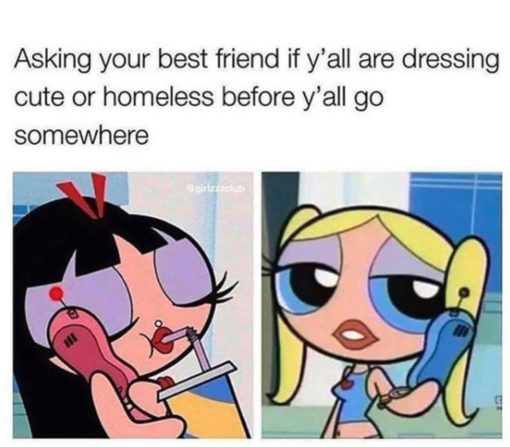Asking your best friend if are dressing cute or homeless before all go somewhere.
This image is a humorous meme featuring two characters from the animated television series "The Powerpuff Girls." The characters depicted are Blossom, seen with a red bow in her hair and holding a phone, and Bubbles, who is also on the phone and has her signature blonde pigtails. Above the picture, there is text that reads, "Asking your best friend if y'all are dressing cute or homeless before y'all go somewhere."
The humor in this image arises from the relatable social situation it describes—friends coordinating outfits before they meet up or go out together. The exaggerated dichotomy between "dressing cute" and "dressing homeless" is a playful way to express the tendency some people have to either dress up or dress very casually, without much middle ground, depending on the occasion.
Another layer of comedy comes from the use of the word "homeless" as an informal term for extremely casual or unkempt dressing. The colloquial use of this word in this context is considered funny because of the hyperbolic nature of the comparison. It taps into the common experience of not putting effort into one's appearance, to the point where the level of casual dress is humorously likened to homelessness.
The meme also presents an inside joke among friends. The need to check with your best friend on the dress code implies a shared understanding and the comfort of checking in with someone who knows you well. It reflects the closeness between friends who are able to communicate and open about their intentions and feelings about their social presentation.
Adding to the humor is the use of beloved childhood cartoon characters to illustrate this adult scenario. The contrast between the innocence often associated with cartoons and the more adult-oriented theme of social appearance creates a juxtaposition that is comical. Such memes repurpose familiar images from popular culture to express contemporary sentiments, bridging a gap between nostalgia and current social dynamics.
Lastly, people might find this funny because the characters’ expressions and the act of being on the phone imply an earnestness about the coordinating effort. Their serious demeanor, contrasted with the frivolity of the situation, plays into the comedic trope of taking trivial matters with grave seriousness, which is a well-established formula for humor.
